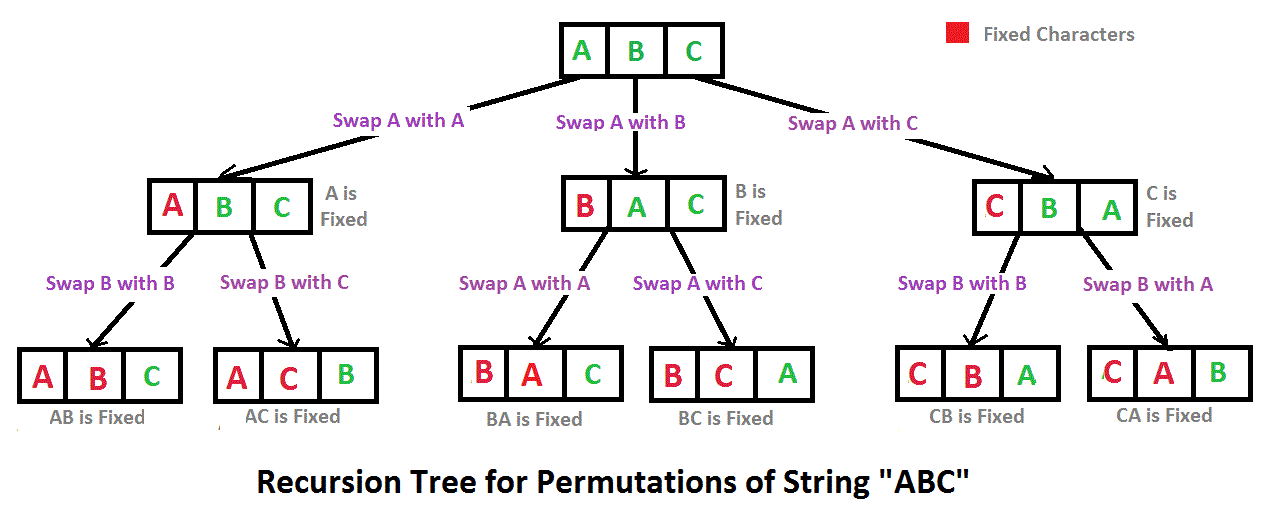A permutation also called an “arrangement number” or “order,” is a rearrangement of the elements of an ordered list S into a one-to-one correspondence with S itself. A string of length n has n! permutation.
Below are the permutations of string ABC.
ABC ACB BAC BCA CBA CAB
- Here is a solution that is used as a basis in backtracking.
// C++ program to print all
// permutations with duplicates allowed
#include <bits/stdc++.h>
using namespace std;
// Function to print permutations of string
// This function takes three parameters:
// 1. String
// 2. Starting index of the string
// 3. Ending index of the string.
void permute(string a, int l, int r)
{
// Base case
if (l == r)
cout<<a<<endl;
else
{
// Permutations made
for (int i = l; i <= r; i++)
{
// Swapping done
swap(a[l], a[i]);
// Recursion called
permute(a, l+1, r);
//backtrack
swap(a[l], a[i]);
}
}
}
// Driver Code
int main()
{
string str = "ABC";
int n = str.size();
permute(str, 0, n-1);
return 0;
}Output
ABC
ACB
BAC
BCA
CBA
CAB
Java Code
// Java program to print all permutations of a
// given string.
public class Permutation
{
public static void main(String[] args)
{
String str = "ABC";
int n = str.length();
Permutation permutation = new Permutation();
permutation.permute(str, 0, n-1);
}
/**
* permutation function
* @param str string to calculate permutation for
* @param l starting index
* @param r end index
*/
private void permute(String str, int l, int r)
{
if (l == r)
System.out.println(str);
else
{
for (int i = l; i <= r; i++)
{
str = swap(str,l,i);
permute(str, l+1, r);
str = swap(str,l,i);
}
}
}
/**
* Swap Characters at position
* @param a string value
* @param i position 1
* @param j position 2
* @return swapped string
*/
public String swap(String a, int i, int j)
{
char temp;
char[] charArray = a.toCharArray();
temp = charArray[i] ;
charArray[i] = charArray[j];
charArray[j] = temp;
return String.valueOf(charArray);
}
}
Output
ABC
ACB
BAC
BCA
CBA
CAB
Python Code
# Python program to print all permutations with
# duplicates allowed
def toString(List):
return ''.join(List)
# Function to print permutations of string
# This function takes three parameters:
# 1. String
# 2. Starting index of the string
# 3. Ending index of the string.
def permute(a, l, r):
if l==r:
print (toString(a))
else:
for i in range(l,r):
a[l], a[i] = a[i], a[l]
permute(a, l+1, r)
a[l], a[i] = a[i], a[l] # backtrack
# Driver program to test the above function
string = "ABC"
n = len(string)
a = list(string)
permute(a, 0, n)
Output
ABC
ACB
BAC
BCA
CBA
CAB
Algorithm Paradigm: Backtracking
Time Complexity: O(n*n!) Note that there are n! permutations and it requires O(n) time to print a permutation.
Auxiliary Space: O(r – l)
Note: The above solution prints duplicate permutations if there are repeating characters in the input string. Please see the below link for a solution that prints only distinct permutations even if there are duplicates in input.
